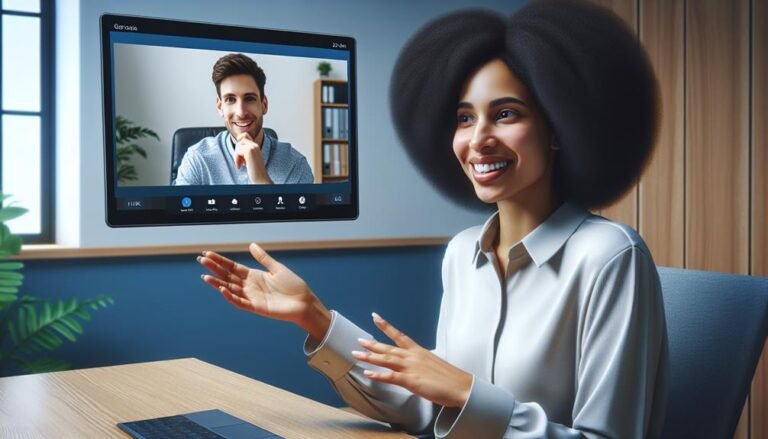Microsoft's Neurodiversity Hiring Program: A Game-Changer
Microsoft's Neurodiversity Hiring Program has been making waves in the corporate world, and for good reason. By actively seeking to attract and support neurodiverse talent, Microsoft is not only promoting inclusion but also tapping into a pool of highly skilled individuals whose unique perspectives can drive innovation.
While the concept of neurodiversity in the workplace is gaining traction, Microsoft's approach and commitment to this initiative set a new standard. This program has the potential to reshape traditional hiring practices and nurture an environment where diverse cognitive abilities are embraced.
Key Takeaways
- Microsoft's neurodiversity initiatives have created a more inclusive and diverse workforce.
- The Autism Hiring Program focuses on recruiting individuals on the autism spectrum and provides a supportive environment, mentorship, and training.
- Microsoft offers tailored interview processes, workplace accommodations, and ongoing support to neurodiverse employees.
- The neurodiversity program at Microsoft has had a positive impact on workplace culture, fostering an environment that embraces the strengths of all individuals.
Microsoft's Commitment to Neurodiversity
Microsoft's commitment to neurodiversity is exemplified through its innovative hiring program and inclusive workplace initiatives.
As part of its corporate responsibility, the tech giant has implemented neurodiversity initiatives aimed at creating a more inclusive and diverse workforce. Microsoft's Autism Hiring Program, for instance, focuses on recruiting individuals on the autism spectrum for full-time positions, recognizing the unique skills and perspectives they bring to the company. Through this program, Microsoft provides a supportive environment, including mentorship and training, to help these individuals thrive in their roles.
Additionally, the company has established partnerships with organizations that specialize in neurodiversity to further support their employees and promote an inclusive culture.
Furthermore, Microsoft has made significant strides in fostering an inclusive workplace by providing resources and accommodations for neurodiverse employees. These include flexible work arrangements, sensory-friendly workspaces, and communication support.
Neurodiversity Hiring Program Overview
Microsoft's Neurodiversity Hiring Program is built on inclusive hiring practices that aim to create a diverse and supportive workplace. The program extends its support to employees, providing them with the tools and resources they need to thrive in their roles.
As a result, the initiative has had a positive impact on the workplace, fostering an environment that embraces and leverages the strengths of all individuals.
Inclusive Hiring Practices
The Neurodiversity Hiring Program at Microsoft aims to create a more inclusive and diverse workforce by implementing innovative hiring practices that prioritize the strengths and capabilities of neurodiverse individuals. This initiative reflects Microsoft's commitment to fostering inclusive workplaces and engaging in diverse talent acquisition.
The following are key components of Microsoft's inclusive hiring practices:
- Tailored Interview Processes: Customizing the interview process to accommodate diverse communication styles and provide a comfortable environment for neurodiverse candidates.
- Ongoing Support and Development: Offering continuous support and development opportunities to ensure the success and well-being of neurodiverse employees.
- Mentorship Programs: Providing mentorship programs to facilitate the integration and growth of neurodiverse individuals within the organization.
- Collaborative Team Structures: Creating collaborative team structures that leverage the unique perspectives and strengths of all employees, including those with neurodiverse traits.
Support for Employees
The comprehensive support provided for neurodiverse employees within the Neurodiversity Hiring Program at Microsoft is a testament to the company's commitment to fostering an inclusive and thriving workplace environment.
Employee well-being is a top priority, and Microsoft ensures that neurodiverse employees have the necessary resources to thrive in their roles. This includes tailored workplace accommodations such as flexible work schedules, quiet workspaces, and assistive technologies, which are provided to support their specific needs.
Additionally, the program fosters a culture of understanding and acceptance, where colleagues and managers are trained to create an inclusive environment. Regular check-ins and feedback mechanisms are in place to address any challenges and ensure that the well-being of neurodiverse employees is consistently supported.
Microsoft's proactive approach to supporting neurodiverse employees sets a commendable example for fostering diversity and inclusion in the workplace.
Positive Impact on Workplace
How has the Neurodiversity Hiring Program at Microsoft positively impacted the workplace and overall company culture?
- Increased Productivity: The program has led to a boost in productivity as neurodiverse employees bring unique problem-solving skills and a different perspective to the table.
- Enhanced Creativity: Microsoft has witnessed a surge in creativity within teams, with neurodiverse employees offering innovative solutions and ideas that may have been overlooked previously.
- Improved Team Dynamics: The program has fostered a more inclusive and understanding work environment, leading to stronger team dynamics and collaboration.
- Positive Company Culture: The Neurodiversity Hiring Program has contributed to a more positive and supportive company culture, where diversity is valued and celebrated, ultimately benefiting all employees.
Benefits of Neurodiversity in the Workplace
Embracing neurodiversity in the workplace can enhance innovation, problem-solving, and creativity, fostering a more dynamic and inclusive organizational culture. By incorporating diverse perspectives and approaches, organizations can harness the unique strengths of neurodiverse individuals, leading to a range of benefits for the workplace.
| Neurodiversity Benefits | Workplace Inclusion | Neurodiversity Innovation |
|---|---|---|
| Varied perspectives | Diverse workforce | Unique problem-solving |
| Enhanced creativity | Equal opportunities | Alternative thinking |
| Improved problem-solving | Inclusive culture | Unconventional ideas |
| Enhanced innovation | Accessibility | Creative solutions |
| Adaptability | Collaborative environment | Fresh insights |
The table above highlights the multifaceted advantages of neurodiversity in the workplace. Varied perspectives and enhanced creativity contribute to improved problem-solving, while fostering an inclusive culture and providing equal opportunities. Neurodiversity fosters an environment where unconventional thinking and unique problem-solving approaches are valued, leading to enhanced innovation and the generation of creative solutions. Additionally, it promotes adaptability and a collaborative environment, ultimately leading to fresh insights and a more dynamic organizational culture.
Impact on Innovation and Creativity
With neurodiversity's positive impact on problem-solving and creativity now established, it is crucial to explore its influence on fostering innovation in the workplace.
Embracing neurodiversity can significantly impact productivity and innovation within an organization. Here's how it can foster innovation:
- Diverse Perspectives: Neurodiverse individuals often have unique perspectives and approaches to problem-solving, leading to innovative solutions that may not have been considered otherwise.
- Enhanced Creativity: Neurodiverse employees can bring fresh and unconventional ideas to the table, sparking creativity and innovation across teams.
- Improved Collaboration: By embracing neurodiversity, organizations can create a culture of inclusivity that encourages collaboration and the exchange of diverse ideas, ultimately fostering a more innovative environment.
- Enhanced Problem-Solving: Neurodiverse individuals often excel at identifying patterns, thinking outside the box, and finding unconventional yet effective solutions, which can significantly impact an organization's ability to innovate and adapt to challenges.
Support and Resources for Neurodiverse Employees
Neurodiverse employees benefit from dedicated support and resources provided by organizations to enhance their workplace experience and ensure their professional growth and success.
Workplace accommodations play a crucial role in creating an inclusive environment for neurodiverse employees. These accommodations may include flexible work schedules, noise-canceling headphones, designated quiet areas, or specialized software to support individual work styles and preferences.
Moreover, employee training programs tailored to neurodiversity support are essential for creating awareness and understanding among all staff members. This training helps colleagues and managers to better understand the strengths and challenges of neurodiverse individuals, fostering a more supportive and collaborative work environment.
Additionally, mentoring and coaching programs can provide valuable support and guidance to neurodiverse employees, helping them navigate workplace challenges and develop their professional skills.
Success Stories of Neurodiverse Employees
Several neurodiverse employees at Microsoft have demonstrated exceptional success in their roles, showcasing the value of inclusive hiring practices and supportive workplace environments. These success stories highlight the positive impact of neurodiverse employee experiences and the effectiveness of workplace accommodations.
- Innovative Problem-Solving: One employee with autism excelled in software development by leveraging their unique ability to think outside the box and solve complex problems in unconventional ways.
- Attention to Detail: A neurodiverse employee with ADHD showcased remarkable attention to detail in quality assurance, consistently identifying critical issues that others might overlook.
- Creative Thinking: A team member with dyslexia brought a fresh perspective to marketing strategies, using their creativity and visual thinking skills to develop highly impactful campaigns.
- Technical Proficiency: Another employee with Asperger's syndrome demonstrated exceptional proficiency in data analysis, leveraging their intense focus and meticulous approach to deliver valuable insights for the company.
These success stories underscore the importance of creating an inclusive and supportive work environment that allows neurodiverse employees to thrive and contribute their unique strengths. By recognizing and accommodating diverse talents, companies like Microsoft can harness the full potential of their workforce.
Changing the Perception of Neurodiversity
The remarkable contributions of neurodiverse employees at Microsoft have not only showcased their unique strengths but have also initiated a shift in the perception of neurodiversity in the workplace. By excelling in their roles and bringing diverse perspectives to the table, these employees have played a pivotal role in changing perceptions of neurodiversity. Their successes have challenged traditional notions of what it means to be a valuable employee, leading to a broader understanding of the immense societal impact that neurodiverse individuals can have.
Microsoft's commitment to fostering an inclusive work environment has not only created opportunities for neurodiverse individuals but has also influenced the way other companies view and approach neurodiversity in their own hiring practices. The success stories of neurodiverse employees at Microsoft are serving as a catalyst for changing societal perceptions, emphasizing the importance of embracing and leveraging the unique strengths that neurodiverse individuals bring to the workforce.
As more companies recognize the value of neurodiversity and actively seek to incorporate it into their hiring strategies, the perception of neurodiversity in the workplace continues to evolve, creating a more inclusive and diverse landscape for all employees.
Neurodiversity Hiring Program's Influence on Other Companies
Microsoft's neurodiversity hiring program has had a significant impact on other companies, influencing them to reconsider their hiring practices. By promoting diversity and inclusion, Microsoft has set an example for other organizations to follow suit, ultimately leading to a more inclusive workforce.
This initiative has the potential to foster a more supportive and accommodating environment for neurodiverse individuals across various industries.
Program Impact on Companies
As the neurodiversity hiring program gains traction, more companies are recognizing the benefits of embracing neurodiverse talent within their workforce. This shift has had a significant impact on productivity, as neurodiverse employees often bring unique perspectives and problem-solving skills to the table. Additionally, it has led to increased diversity awareness within companies, fostering a more inclusive and understanding work environment.
The program's influence on other companies can be seen in the following ways:
- Enhanced creativity and innovation within teams
- Improved employee morale and satisfaction
- Expansion of talent pool and access to previously untapped skills
- Strengthened community and customer relationships through a more representative workforce
Changing Hiring Practices
Recognizing the positive outcomes experienced by companies that have embraced neurodiverse talent, there has been a noticeable shift in hiring practices towards greater inclusion of neurodiverse individuals.
This shift is evident in the increasing adoption of inclusive hiring practices, where companies actively seek to attract and accommodate individuals with diverse neurological profiles.
The influence of Microsoft's neurodiversity hiring program has sparked a broader conversation about workplace diversity, prompting other companies to reevaluate their hiring processes.
As a result, more organizations are exploring ways to create an inclusive environment that welcomes individuals with varying cognitive abilities.
This shift signifies a departure from traditional hiring norms and a recognition of the value that neurodiverse individuals bring to the workforce.
It is clear that the impact of Microsoft's initiative extends beyond the company itself, shaping the hiring landscape for the better.
Promoting Diversity and Inclusion
The adoption of inclusive hiring practices, particularly in relation to neurodiverse talent, has prompted a widespread reevaluation of workplace diversity and inclusion strategies among companies. Microsoft's Neurodiversity Hiring Program has had a profound influence on other companies, promoting awareness and fostering empathy for neurodiverse individuals.
This has led to a shift in how companies approach diversity and inclusion, celebrating uniqueness and breaking barriers for individuals with neurodiverse conditions. The program has inspired other companies to prioritize creating inclusive environments that embrace the strengths of all employees, regardless of neurodiversity.
As a result, more companies are actively seeking to implement similar initiatives to ensure that their workplaces are truly inclusive and supportive of individuals with diverse neurological profiles.
Overcoming Challenges and Misconceptions
There is a need to address the barriers and misunderstandings surrounding neurodiversity in the workplace. One of the main challenges is the misunderstanding of what neurodiversity entails, leading to the perpetuation of stereotypes. Addressing these misconceptions is crucial in creating an inclusive environment where neurodiverse individuals can thrive. By debunking myths and providing accurate information, organizations can foster a more supportive culture.
| Challenges | Misconceptions | Solutions |
|---|---|---|
| Lack of awareness | Neurodiverse individuals are often misunderstood due to a lack of awareness about different neurological conditions. | Implementing neurodiversity training and awareness programs to educate employees and foster understanding. |
| Stereotyping | Neurodiverse individuals are frequently subjected to stereotypes, such as being seen as incapable or difficult to work with. | Promoting positive narratives and highlighting the strengths and contributions of neurodiverse employees to challenge stereotypes. |
| Communication barriers | Difficulties in communication can lead to misunderstandings and isolation for neurodiverse individuals. | Providing communication support and accommodations, such as clear guidelines and alternative communication methods, to facilitate understanding and inclusion. |
| Stigma | Stigma surrounding neurological differences can create a hostile work environment for neurodiverse individuals. | Creating a culture of acceptance and support through open discussions, advocacy, and zero-tolerance policies for discrimination. |
Future of Neurodiversity in Employment
As society continues to recognize the value of diverse perspectives in the workplace, the future of neurodiversity in employment holds promise for fostering innovation and inclusivity. The following trends and developments are shaping the future of neurodiversity inclusion and employment opportunities:
- Greater Awareness and Understanding: As awareness of neurodiversity grows, there is a shift towards understanding the strengths and abilities that neurodiverse individuals bring to the workplace. Employers are increasingly recognizing the unique skills and perspectives that neurodiverse individuals offer.
- Tailored Support and Accommodations: Companies are investing in tailored support and accommodations to create an inclusive environment for neurodiverse employees. This may include flexible work arrangements, specialized training, and mentorship programs.
- Collaborative Partnerships: Employers are forming partnerships with organizations and advocacy groups that specialize in supporting neurodiverse individuals. These collaborations aim to provide resources, guidance, and best practices for fostering neurodiversity inclusion in the workplace.
- Advancements in Recruitment and Hiring Practices: Companies are evolving their recruitment and hiring practices to be more inclusive of neurodiverse talent. This may involve implementing alternative interview processes, targeted outreach, and mentorship programs.
The future of neurodiversity in employment is characterized by an increasing emphasis on creating supportive, inclusive, and innovative workplaces that harness the unique strengths of all individuals.
Conclusion
In conclusion, Microsoft's neurodiversity hiring program has proven to be a game-changer in the workplace, embracing the unique skills and perspectives of neurodiverse individuals. The impact on innovation and creativity has been significant, challenging traditional notions of productivity and success.
As other companies follow suit, the future of neurodiversity in employment looks promising. It's ironic that what was once seen as a challenge has now become a valuable asset in driving success and progress in the corporate world.






